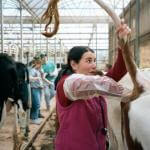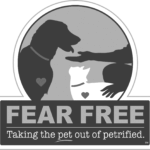Embrace the Tofu
January 11, 2015
This post could also be titled: Why I Became a Vegetarian at the Ripe Old Age of 35. Fair warning: I will be on my soapbox a bit in this post. My goal is not to guilt, convert or shame anyone into changing their own eating habits. Food is one of the most wonderful joys in life (I’m Italian, remember), but our food system in America is broken. Impoverished Americans live in “food deserts” without access to any fresh fruit or vegetables, obesity and its associated complications are crippling our health care system and most Americans don’t know where their food comes from, or how to interpret a food label.
 Somehow, I made it through four years of veterinary school still eating meat. Dissecting cats, dogs, goats and horses in anatomy class did not convert me to vegetarianism. Conversations with many passionate vegetarian classmates did not convert me. Caring for innumerable farm animals during my fourth year rotations did not convert me. Granted, I was never a voracious carnivore, enjoying only an occasional burger or a turkey sandwich a few times a week. But I did make it well past veterinary school, well into my thirties before I became convinced that vegetarianism was the right choice for me.
Somehow, I made it through four years of veterinary school still eating meat. Dissecting cats, dogs, goats and horses in anatomy class did not convert me to vegetarianism. Conversations with many passionate vegetarian classmates did not convert me. Caring for innumerable farm animals during my fourth year rotations did not convert me. Granted, I was never a voracious carnivore, enjoying only an occasional burger or a turkey sandwich a few times a week. But I did make it well past veterinary school, well into my thirties before I became convinced that vegetarianism was the right choice for me.
Two seminal works, the book “The Omnivore’s Dilemma” by the amazing Michael Pollan and the movie “Food, Inc.”, incited my own personal food revolution. I read “The Ominvore’s Dilemma” first, and it inspired, educated and concerned me enough to learn more about where our food (animal, vegetable and otherwise) comes from. Sir Pollan convinced me of the value of buying organic and local produce, and the value of reading food labels. His mantra is so simple: “Eat food. Not too much. Mostly plants.” We have been proud members of a CSA (community-supported agriculture) for five years, and it has profoundly changed they way we eat for the better. Thank you for introducing me to kiwi berries, rainbow chard and the amazing orange-colored yolk of farm fresh eggs, Lancaster Farm Fresh!
Watching “Food Inc.” was really the final step in my conversion to a vegetarian lifestyle. I had been gradually eliminating most meat prior to The Book and The Movie, but these two masterpieces finally convinced me to give up those beloved hamburgers for good. “Food, Inc.” depicts how food animals are housed in deplorable, inhumane conditions. It discusses America’s dependence on corn, and how corn-derived products have infiltrated virtually every processed food item in the United States. Corn has also become the main component in cow, pig and farm-raised salmon feed. Think that farm-raised salmon is a healthy choice for you? Studies have shown that salmon raised on corn has less omega-3’s and is less healthy than grass-fed, free-range beef! Not only do we treat our food animals horrendously in America, we feed them diets that are so distant from their natural food sources, we have made our food supply and ourselves unhealthy as a result.
The reality is that, since I have devoted my life to saving and protecting animals, I felt I could not contribute to a food system that did not treat our food animal supply ethically. Believe me when I say that I think that humans are evolutionarily designed and destined to be omnivores. But we are not designed to consume three meals a day of caged, corn-fed beef, pork and chicken. Our voracious desire for cheap, frequent meals containing meat is damaging to our bodies, our animals and our planet. Just this week, The Washington Post reported that the USDA is considering recommending that Americans eat less meat, not only because it’s healthier, but because reduced meat consumption will also dramatically reduce greenhouse gas emission.
It is possible to treat food animals humanely, allow them access to the outdoors, allow them to graze as they should, and keep them healthy and parasite-free without the use of antibiotics. It is possible. Food pioneers such as Joel Salatin of Polyface Farms and the amazing farmers at Stone Barns are serving as a models for how meat can be humanely, thoughtfully and healthfully raised. Temple Grandin has revolutionized how food animals are treated before slaughter, and her humane handling methods have been widely adopted by the meat industry. CSA’s like Lancaster Farm Fresh and Red Earth Farm are empowering suburban and urban consumers to eat local, organic and seasonal produce.
My choice to become a vegetarian, to eat organic, and to support local agriculture is my small part in America’s food revolution. If all of us take the time to learn where our food comes from, how it is treated and/or grown before it arrives in our stores and what impact our eating habits have on our planet, then our food animals, our health and our environment will all benefit!



